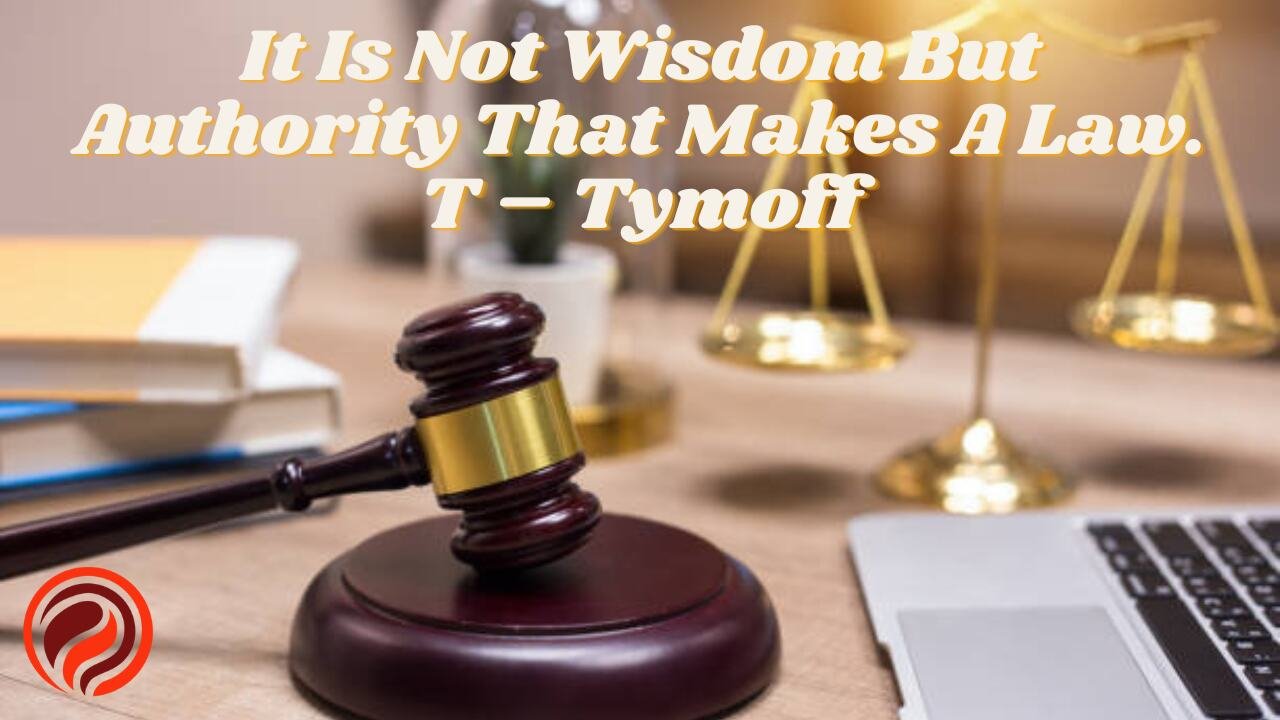In lawmaking and governance, a thought-provoking assertion comes to the fore, encapsulated in the phrase, “It Is Not Wisdom But Authority That Makes A Law,” attributed to an enigmatic figure named T-Tymoff. This statement invites us to delve deep into what truly drives the creation and enforcement of laws within societies. Is it the profound sagacity and ethical insights, often termed as wisdom, that guide the hand of justice, or is it the sheer might of authority that brings laws into existence and ensures their adherence?
Authority in Lawmaking
Authority, as understood in the context of governance, is the recognized power that entities or individuals have to make decisions and enforce norms and laws. This power can stem from various sources, such as democratic elections, societal consensus, or historical precedence. In the theater of lawmaking, this authority transforms ideas and proposals into binding rules that govern society. With authority, the most enlightened and informed concepts remain abstractions, able to influence real-world actions or bring about societal order.
The Role of Wisdom
Wisdom, in contrast, is the deep understanding and insight that ideally should inform the creation of laws. It encompasses ethical considerations, human nature and society knowledge, and history lessons. Wisdom seeks to ensure that laws are effective in maintaining order and are just, equitable, and beneficial for the common good. While wisdom can illuminate the path to fair and enlightened legislation, it lacks the inherent power to enforce its insights. With the muscle of authority, wisdom’s influence on lawmaking is unlimited; its voice is often drowned out by the clamor of more immediate and pragmatic concerns.
Dynamic Interplay
The relationship between authority and wisdom in lawmaking is dynamic and complex. Authority without wisdom can lead to the creation of laws that are arbitrary, unjust, or disconnected from the needs and values of society. Such laws might enforce order but at the cost of fairness and public trust. On the other hand, wisdom without the power to enact change can result in a society that understands its flaws but is impotent to correct them, like a physician who can diagnose but not treat.
Implications for Society
The balance between authority and wisdom in lawmaking has profound implications for the health and functioning of society. Laws that are created and enforced with a keen understanding of justice and human values tend to foster societies that are more cohesive, just, and resilient. However, when authority operates in a vacuum devoid of wisdom, it risks creating a legal framework that is rigid, oppressive, or out of touch with the populace’s needs and moral compass.
Historical and Contemporary Examples
History is replete with instances where the tension between authority and wisdom in lawmaking has come to the fore. From ancient legal codes to modern-day legislation, the impact of this dynamic is evident. Contemporary debates around digital privacy, environmental regulation, and social justice highlight the ongoing struggle to balance the authoritative power to enact laws and the wise discernment of what those laws should entail.
Do Read: Paul Mackoul, MD Lawsuit: What You Need to Know
Conclusion
The assertion “It Is Not Wisdom But Authority That Makes A Law” by Tymoff catalyzes a deeper exploration of the underpinnings of our legal systems. While authority is the mechanism that enforces laws, the role of wisdom — in guiding and shaping those laws — cannot be underestimated. The quest for a legal system that embodies the right measure of both is an ongoing journey reflective of society’s evolving values, challenges, and understanding of justice.
As we ponder Tymoff’s statement, we are encouraged to reflect on the nature of our legal frameworks: Are they the product of authority, wisdom, or an intricate dance between the two? In contemplating this, we grasp the nuances of lawmaking and appreciate the delicate balance that must be struck to forge an orderly and just society.













